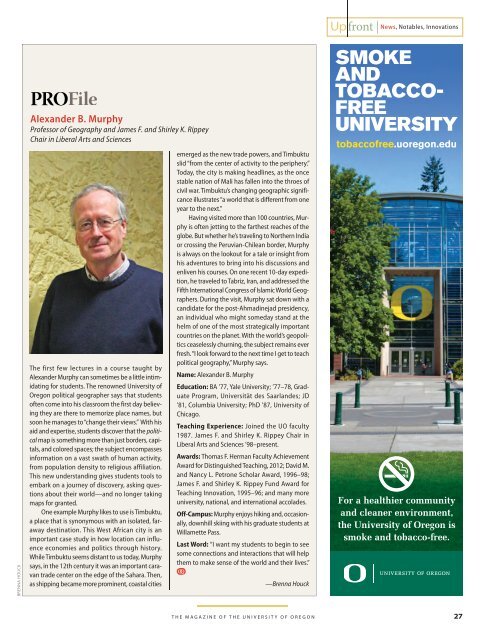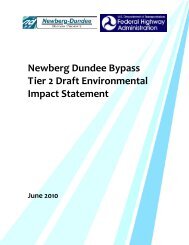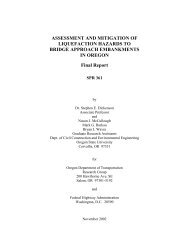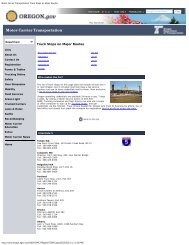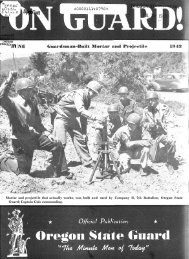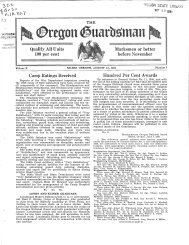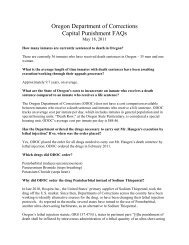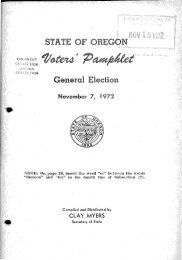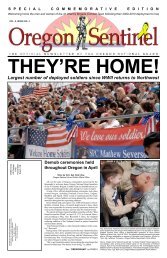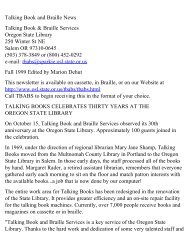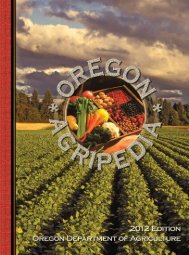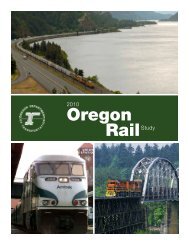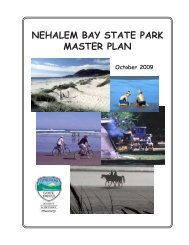Summer 2013 - Oregon State Library: State Employee Information ...
Summer 2013 - Oregon State Library: State Employee Information ...
Summer 2013 - Oregon State Library: State Employee Information ...
Create successful ePaper yourself
Turn your PDF publications into a flip-book with our unique Google optimized e-Paper software.
BRENNA HOUCK<br />
PROFile<br />
Alexander B. Murphy<br />
Professor of Geography and James F. and Shirley K. Rippey<br />
Chair in Liberal Arts and Sciences<br />
The first few lectures in a course taught by<br />
Alexander Murphy can sometimes be a little intimidating<br />
for students. The renowned University of<br />
<strong>Oregon</strong> political geographer says that students<br />
often come into his classroom the first day believing<br />
they are there to memorize place names, but<br />
soon he manages to “change their views.” With his<br />
aid and expertise, students discover that the political<br />
map is something more than just borders, capitals,<br />
and colored spaces; the subject encompasses<br />
information on a vast swath of human activity,<br />
from population density to religious affiliation.<br />
This new understanding gives students tools to<br />
embark on a journey of discovery, asking questions<br />
about their world—and no longer taking<br />
maps for granted.<br />
One example Murphy likes to use is Timbuktu,<br />
a place that is synonymous with an isolated, faraway<br />
destination. This West African city is an<br />
important case study in how location can influence<br />
economies and politics through history.<br />
While Timbuktu seems distant to us today, Murphy<br />
says, in the 12th century it was an important caravan<br />
trade center on the edge of the Sahara. Then,<br />
as shipping became more prominent, coastal cities<br />
emerged as the new trade powers, and Timbuktu<br />
slid “from the center of activity to the periphery.”<br />
Today, the city is making headlines, as the once<br />
stable nation of Mali has fallen into the throes of<br />
civil war. Timbuktu’s changing geographic significance<br />
illustrates “a world that is different from one<br />
year to the next.”<br />
Having visited more than 100 countries, Murphy<br />
is often jetting to the farthest reaches of the<br />
globe. But whether he’s traveling to Northern India<br />
or crossing the Peruvian-Chilean border, Murphy<br />
is always on the lookout for a tale or insight from<br />
his adventures to bring into his discussions and<br />
enliven his courses. On one recent 10-day expedition,<br />
he traveled to Tabriz, Iran, and addressed the<br />
Fifth International Congress of Islamic World Geographers.<br />
During the visit, Murphy sat down with a<br />
candidate for the post-Ahmadinejad presidency,<br />
an individual who might someday stand at the<br />
helm of one of the most strategically important<br />
countries on the planet. With the world’s geopolitics<br />
ceaselessly churning, the subject remains ever<br />
fresh. “I look forward to the next time I get to teach<br />
political geography,” Murphy says.<br />
Name: Alexander B. Murphy<br />
Education: BA ’77, Yale University; ’77–78, Graduate<br />
Program, Universität des Saarlandes; JD<br />
’81, Columbia University; PhD ’87, University of<br />
Chicago.<br />
Teaching Experience: Joined the UO faculty<br />
1987. James F. and Shirley K. Rippey Chair in<br />
Liberal Arts and Sciences ’98–present.<br />
Awards: Thomas F. Herman Faculty Achievement<br />
Award for Distinguished Teaching, 2012; David M.<br />
and Nancy L. Petrone Scholar Award, 1996–98;<br />
James F. and Shirley K. Rippey Fund Award for<br />
Teaching Innovation, 1995– 96; and many more<br />
university, national, and international accolades.<br />
Off-Campus: Murphy enjoys hiking and, occasionally,<br />
downhill skiing with his graduate students at<br />
Willamette Pass.<br />
Last Word: “I want my students to begin to see<br />
some connections and interactions that will help<br />
them to make sense of the world and their lives.”<br />
—Brenna Houck<br />
SMOKE<br />
AND<br />
TOBACCO-<br />
FREE<br />
UNIVERSITY<br />
tobaccofree.uoregon.edu<br />
For a healthier community<br />
and cleaner environment,<br />
the University of <strong>Oregon</strong> is<br />
smoke and tobacco-free.<br />
THE MAGAZINE OF THE UNIVERSITY OF OREGON 27


